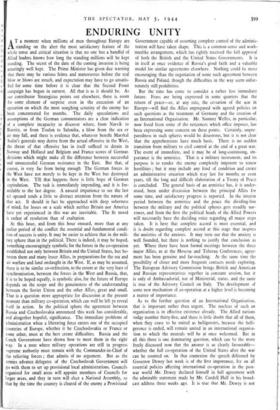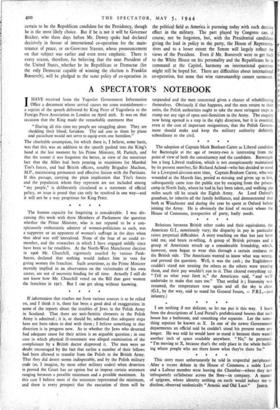ENDURING UNITY
A T a moment when millions of men throughout Europe are standing on the alert the most satisfactory feature of the whole tense and critical situation is that no one but a handful of Allied leaders knows how long the standing millions will be kept standing. The secret of the date of the coming invasion is being amazingly well kept. The Prime Minister has given due warning that there may be various feints and manoeuvres before the real blow or blows are struck, and expectation may have to go unsatis- fied for some time before it is clear that the Second Front campaign has begun in earnest. All that is as it should be. As our contributor Strategicus points out elsewhere, there is room for some element of surprise even in the execution of an operation on which the most searching scrutiny of the enemy has been concentrated for months. The daily speculations and assumptions of the German commentators are a clear indication of a complete incapacity to discover where, from Narvik to Biarritz, or from Toulon to Salonika, a blow from the sea or air may fall, and there is evidence that, whatever benefit Marshal Stalin's generals may derive from the actual offensive in the West, the threat of that offensive has in itself sufficed to detain in Norway and Holland and Belgium and France scores of German divisions which might make all the difference between successful and unsuccessful German resistance in the East. But that, of course, is very far from being enough. The German forces in the West have not merely to be kept in the West but destroyed in the West. Till that happens there is little hope of German capitulation. , The task is immediately impending, and it is for- midable to the last degree. A natural impatience to see the last act opened tends .a little to distract attention from the nature of that act. It should in fact be approached with deep soberness of mind, for losses on a scale which neither Britain nor America have yet experienced in this war are inevitable. The fit mood is rather of resolution than of exaltation.
At this hour, and from this hour onward, more than at any earlier period of the conflict the essential and fundamental condi- tion of success is unity. It may be easier to achieve that in the mili- tary sphere than in the political. There is indeed, it may be hoped, something encouragingly symbolic for the future in the co-operation established not only between Britain and the United States, but be- tween them and many lesser Allies, in preparations for the sea and air warfare and land onslaught in the West. If, as may be assumed, there is to be similar co-ordination, to the extent at the very least of synchronisation, between the forces in the West and Russia, that, it is to be hoped equally, is symbolic also, for the future of Europe depends on the scope and the genuineness of the understanding between the Soviet Union and the other Allies, great and small. That is a question more appropriate for discussion at the present moment than military co-operation, which can well be left to reveal itself in action. In the .political sphere the agreement between Russia and Czechoslovakia announced this week has considerable, and altogether hopeful, significance. The immediate problems of administration when a liberating force enters one of the occupied countries of Europe, whether it be Czechoslovakia or France or some other, must at the best create difficulties. Russia and the Czech Government have shown how to meet them in the right way. In a zone where military operations are still in progress supreme authority must remain with the Commander-in-Chief of the relieving forces ; that admits of no argument. But as the armies advance delegates of the Czechoslovak Government will go with them to set up provisional local administrations. Councils organised for small areas will appoint members of Councils for larger areas, and they in turn will elect a National Assembly, so that by the time the country is cleared of the enemy a Provisional Government capable of assuming complete control of the adminis- tration will have taken shape. This is a common-sense and work- manlike arrangement, which has rightly received the full approval of both the British and the United States Governments. It is in itself at once evidence of Russia's good faith and a valuable model for similar agreements elsewhere. Nothing could be more encouraging than the negotiation of some such agreement between Russia and Poland, though the difficulties in the way seem unfor- tunately still prohibitive.
But the time has come to consider a rather less immediate future. Fears are being expressed in some quarters that the return of peace—or, at any rate, the cessation of the war in Europe—will find the Allies unprepared with agreed policies on such questions as the treatment of Germany and the creation of an International Organisation. Mr. Sumner Welles, in particular, now freed from some of the reticences which office imposes, has been expressing some concern on these points. Certainly, unpre- paredness in such spheres would be disastrous, but it is not clear that the apprehensions have much basis. There is no sudden transition from military to civil control at the end of a great war. The event of immediate, and it may be of long-continuing, im- portance is the armistice. That is a military instrument, and its purpose is to render the enemy completely impotent to renew hostilities ; but it may include any kind of condition and create an administrative situation which may last for months or even years, till the long and difficult elaboratiOn of a Treaty of Peace is concluded. The general basis of an armistice has, it is under- stood, been under discussion between the principal Allies for some time, and satisfactory progress is reported. In the interim period between the armistice and the peace the dividing-line between the military and the political spheres gets steadily nar- rower, and from the first the political heads of the Allied Powers will necessarily have the deciding voice regarding all major steps , taken. It is here that complete accord is most essential, and it is doubt regarding complete accord at this stage that inspires the anxieties of the anxious. It may turn out that the anxiety is well founded, but there is nothing to justify that conclusion as yet. Where there have been formal meetings between the three major Allies, as at the Moscow and Teheran Conferences, agree- ment has been genuine and far-reaching. At the same time the possibility of closer and more frequent contacts needs exploring. The European Advisory Commission brings British and American and Russian representatives together in constant session, but it is only of Ambassadorial, not of Ministerial, status, and the same is true of the Advisory Council on Italy. The development of some new mechanism of co-operation at a higher level is becoming a matter of importance.
As to the further question of an International Organisation, that is important rather than urgent. The nucleus of such an organisation is in effective existence already. The Allied nations today number thirty-five, and there is little doubt that all of them, when they cease to be united as belligerents, because the belli- gerence is ended, will remain united in an international organisa- tion to which the neutrals will be at once welcomed. But in all this there is one dominating question, which can be the more freely discussed now that the answer is so clearly favourable— whether the full co-operation of the United States after the war can be counted on. In that connexion the speech delivered by Governor Dewey last week is of the first importance, for on all essential policies affecting international co-operation in the post- war world Mr. Dewey declared himself in 'full agreement with the admirable statement made by Mr. Cordell Hull in his broad- cast address three weeks ago. It is true that Mr. Dewey is not certain to be the Republican candidate for the Presidency, though he is the most likely choice. But if he is not it will be Governor Bricker, who three days before Mr. Dewey spoke had declared decisively in favour of international co-operation for the main- tenance of peace, or ex-Governor Stassen, whose pronouncement on that subject was earlier and even more emphatic. There is every reason, therefore, for believing that the next President of the United States,. whether he be Republican or Democrat (for the only Democrat capable of winning the election is Franklin Roosevelt), will be .pledged to the same policy of co-operation in the political field as America is pursuing today with such decisive effect in the military. The part played by Congress can, (,f course, not be forgotten, but, with the Presidential candidates giving the lead in policy to the party, the House of Representa- tives and to a lesser extent the Senate will largely reflect the views of the President. Even if Mr. Roosevelt were to get back to the White House on his personality and the Republicans be in command at the Capitol, harmony on international questions might still be hoped for. There are difficulties about international co-operation, but none that wise statesmanship cannot. surmount.























 Previous page
Previous page